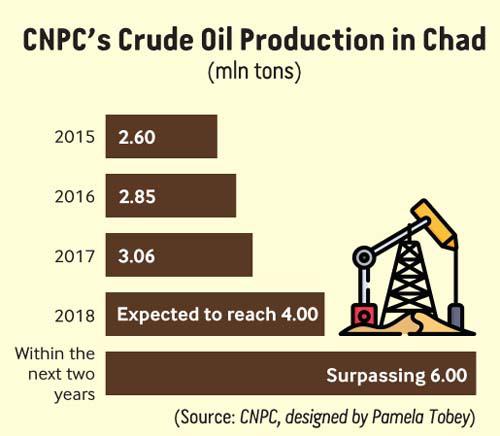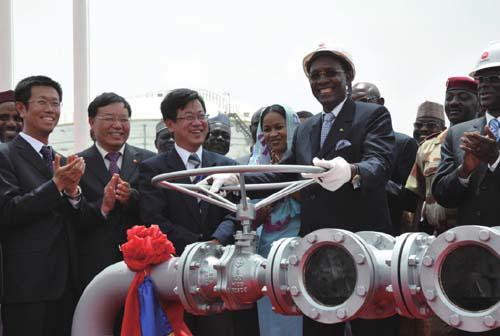Oiling the Gears
2018-09-20ByDengYaqing
By Deng Yaqing


Deep in the interior of Central Africa lies the Republic of Chad, a country dependent on agriculture for most of its revenue. Below the surface, it has abundant reserves of petroleum, but it was not until the Chinese oil and gas giant China National Petroleum Corp. (CNPC) began production there in 2011 that the country finally realized energy self-suffi ciency.
When CNPC first set foot in Chad 15 years ago, domestic oil consumption in the country was heavily dependent on imports. In September 2007, a bilateral agreement was reached to build a joint-stock refi nery plant, marking the starting point of ChinaChad petroleum cooperation.
As the Ndjamena refinery plant went into production in June 2011, President Idriss Déby Itno described how his country had won the victory of energy independence, which he attributed to Chads signifi cant partnership with China.
Now, the CNPC operation covers the entire petroleum industrial chain in Chad, ranging from exploration and development, pipeline transportation, refining and storage, project construction and technology services.
This type of success story is not confined to Chad. CNPCs cooperation with Sudan began back in 1995, and that project has now become the largest and most successful CNPC overseas venture. In Niger, a complete petroleum industrial system has taken shape under a partnership with CNPC, allowing the country to not only realize oil self-sufficiency, but also earn foreign exchange through oil exports. Now, the petroleum industry is the backbone of the local economy. Besides Chad and Niger, the CNPC West African branch has also seen its operations spread into Algeria, Mozambique and Tunisia.
Solid progress
With support from a Chadian partner and its stakeholders, CNPC has developed two exploration and extraction projects, two crude oil pipeline projects and the Ndjamena refinery that can produce gasoline, diesel, aviation fuel, fuel oil, liquefied natural gas and polypropylene.
By the end of July this year, the company had developed six oil fields in Chad and transported 13.24 million tons of crude oil. Its annual oil production has maintained steady growth in recent years and is expected to reach 4 million tons this year. Company data show that in the near future, petroleum exploration and development capacity in Chad will reach 6 million tons.
Going from risk exploration to largescale development in Chad, CNPC says it routinely follows the principle of seeking quality and efficiency while maintaining sustainable development.
“CNPCs oil exploration and development activities in Africa are guided by the concepts of mutual benefit and win-win cooperation. The company strictly follows local policies, laws and regulations, and upholds a multinational corporate culture of mutual respect, openness and compatibility,” said Chen Shudong, General Manager of CNPC International, West Africa Ltd.(Chad).
Chad has now seen a steady domestic supply of oil products from the Ndjamena refinery, and exports part of the output to neighboring countries, laying a solid foundation for the nations economy and strength.
In Niger, CNPCs West Africa branch had paid over $1 billion in taxes to the government by the end of 2017. As of May this year, the company has produced 5.28 million tons of crude oil in the country, according to CNPC statistics.
Corporate responsibilities
In Sudan and South Sudan, CNPC has been fulfi lling its social responsibilities by engaging in well-planned activities to provide public benefi ts. The company has invested$120 million to support the development of agriculture, education, culture, medical care and infrastructure, benefiting more than 2 million African people.
By promoting the integration of diverse cultures within the company, employees with different cultural backgrounds can understand and trust each other and live in harmony with local communities, said Chen.
In the hinterland of Niger in the Sahara Desert, the shortage of water is an obvious problem. To raise the living standards of residents in nearby cities and towns, CNPC has dug 29 wells and more than 40 water sources for use by local households and animal husbandry.
The same arid conditions are also a challenge to Chad. By the end of July, a total of 27 wells had been drilled by CNPC, benefi ting 25,000 residents in 21 villages.
In addition to water scarcity, gaining access to education in some African countries is still diffi cult for many children. The CNPC Niger branch says that it has built 38 schools in areas neighboring its upstream projects and oil pipelines in the past few years. In Chad, two primary schools have been built and study materials sponsored at three local schools. A joint education program with a local university near the refi nery plant has been maintained for several years, while local students and technicians have been sent to China to receive further training and education.
Since CNPC entered the Chadian market in 2003, the company has signed a large number of purchasing and service contracts with local enterprises, substantially boosting Chads economic development.
FOCAC connection
With the Ndjamena refinery coming into production, the retail price of refi ned oil in Chad was reduced by about one third, and the country eventually started to develop its own polypropylene processing industry.
Chen said that the Forum on ChinaAfrica Cooperation (FOCAC) is the most extensive, highest-level and most influential platform for communication between China and African countries to date.
“It will play an increasingly important role in promoting mutually beneficial cooperation between China and Africa in the fi eld of energy, especially oil in the case of CNPC, and in building a community with a shared future for mankind,” he said.
CNPC will strengthen cooperation with related countries in Africa in its oil and gas business through deep cooperation with resource countries and take an active role in maintaining the partnership between China and Africa, said Chen.
Adhering to the business principles of being sincere, hands on and honest, CNPC aims to continue pushing forward its cooperation plans with African countries, assist Africa in developing itself alongside China, and facilitate regional industrialization and agricultural modernization, in an effort to achieve win-win results and realize shared development.
